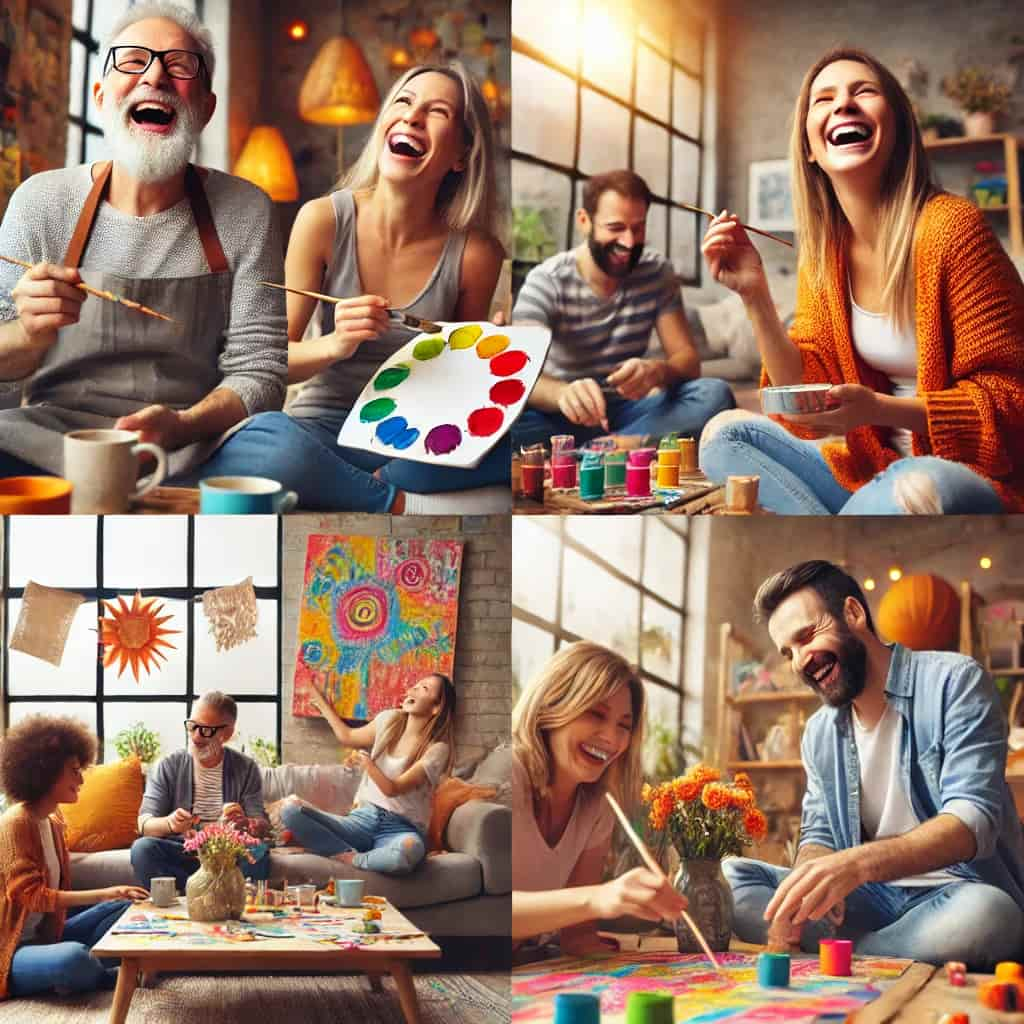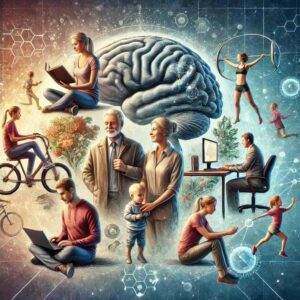First question: 🤔 When you see children playing intensely, what do you think? My guess—like 99.99999% of people—is that it feels like a good thing. Something honest, natural, and beyond words. It just feels right, doesn’t it? 🌟
Second question: 🤷♂️ As an adult, how much play do you have in your life? Unless you have young children, the percentage is probably pretty low for most people. 📉
Final question: 💡 Would you like to develop more creatively, boost your cognitive abilities, and feel more at home in the world? 🌍
If so, you might love what cutting-edge science has to say about the power of play—for adults. 🎮✨ And that’s exactly what we’re going to explore today. Let’s dive in! 🚀

Let’s face it: As adults, we often underestimate the value of play, dismissing it as unproductive or trivial. Yet, modern research paints a different picture: play is a catalyst for well-being, igniting creativity, building resilience, and fostering meaningful connections.
When we neglect play, we inadvertently limit our growth—both personally and professionally. So here’s a thought: what simple moments of play could you weave into your day to spark more joy, balance, and vitality in your life? 🌟
Why Does Play Matter for Adults?
Simply put, we grow and develop best when we play. Play isn’t just about having fun; it’s about curiosity, experimentation, and engaging with life in a way that sparks joy and growth.
Here’s what this article will cover:
- 🎨 The science of how play rewires your brain for creativity and adaptability.
- 🌱 The mental health and resilience benefits of play.
- 🎉 Practical ways to incorporate play into your daily life, even with a busy schedule.
Ready to reclaim your playful side and unlock your potential? Let’s dive in. 🌈
🎯 What is Play, and Why Does It Work?

At its core, play is an activity you do for the sheer joy of it. Unlike work, which often feels like a chore, play is driven by curiosity and enjoyment. This distinction is vital:
- Play: Stimulates curiosity and passion, making challenges feel exciting. Over time, this intrinsic motivation fosters natural growth. 🌟
- Work: Often feels obligatory, leading to burnout if not balanced with play. 🛑
The magic of play lies in its ability to keep you engaged while allowing you to explore new possibilities without fear of failure. It’s a safe space for experimentation, which is why it’s one of the most effective tools for learning and personal growth.
🧠 The Science Behind Play: How Fun Fuels Your Brain

Modern neuroscience reveals that play isn’t just enjoyable—it’s transformative. Here’s how it rewires your brain for growth and resilience:
Predictive Processing (PP) 🧩
Your brain is a prediction machine, constantly trying to anticipate what’s next. Play disrupts these patterns with novelty, encouraging your brain to adapt and grow. Activities like puzzles or sports help you enter a “flow state,” where focus and creativity thrive.
Relevance Realization (RR) 🎯
Play hones your ability to focus on what truly matters. By introducing novelty and excitement, it keeps your mind sharp and engaged, helping you prioritise meaningful experiences over distractions.
Zone of Proximal Development (ZPD) 📈
The ZPD highlights the importance of challenges that are “just right”—not too hard, not too easy. Play naturally places you in this sweet spot, promoting steady growth while keeping the experience enjoyable.
Bottom Line: Play strengthens cognitive flexibility, fuels creativity, and builds resilience—all while being fun. 🌈✨
🌟 The Incredible Benefits of Play for Adults

Incorporating play into your life isn’t just fun—it’s life-changing. Here’s what you gain:
🎨 Enhanced Creativity
Play helps you think outside the box, unlocking innovative solutions to challenges.
😊 Lower Stress Levels
By releasing feel-good hormones like endorphins, play reduces stress and improves your mood.
🌱 Greater Resilience
Low-stakes challenges in play build emotional strength, making it easier to navigate real-life difficulties.
🤝 Stronger Relationships
Play fosters trust, connection, and communication, deepening bonds with friends, family, and colleagues.
🧠 Sharper Thinking
Engaging in playful activities keeps your mind agile, helping you approach life’s challenges with clarity and focus.
🎉 How to Incorporate Play into Your Busy Life

You don’t need hours of free time to embrace play. Small, intentional activities can make a big difference. Here are practical ways to infuse play into your routine:
1. Solve Puzzles and Games 🎲
- Why It Works: Puzzles challenge your brain, enhancing memory and problem-solving skills.
- How to Start: Try Sudoku, crossword puzzles, or strategy games like chess. Host a game night with friends for added social benefits. 🌟
2. Explore a New Hobby 🎨
- Why It Works: Hobbies activate creativity and reduce stress.
- How to Start: Pick something you’ve always wanted to try, like painting, gardening, or playing an instrument. Remember, it’s about the process, not perfection! 🌈
3. Social Play Activities 👫
- Why It Works: Shared play builds stronger connections and fosters trust.
- How to Start: Join a local sports league, host trivia nights, or plan outdoor adventures like hiking or picnics. ❤️
4. Mini Challenges 💪
- Why It Works: These align with your ZPD, gently pushing your limits.
- How to Start: Try small goals like learning a new recipe, mastering a yoga pose, or completing a creative project.
🐢 Why Gradual Progress in Play Matters

Play is most effective when approached with patience and consistency. Start small—15 minutes a day of doodling, puzzles, or a playful walk can create profound changes over time.
Gradual progress ensures that you stay in the “Goldilocks zone,” where challenges are stimulating but not overwhelming. This approach promotes sustainable growth and long-term benefits. 🌱✨
🌍 Real-World Benefits of Embracing Play

Play isn’t just about having fun—it’s about thriving. Here’s how it transforms your life:
- 💼 Boosts Productivity: Playful breaks recharge your brain, improving focus and efficiency.
- 🧠 Enhances Problem-Solving: Play fosters cognitive flexibility, making you better equipped to tackle challenges.
- 😊 Balances Emotions: It releases stress, helping you stay resilient and positive.
- 🤝 Deepens Relationships: Shared play strengthens connections, creating meaningful bonds.
Do’s and Don’ts for Embracing Play ✔️❌

✅ Do: Explore new activities! Experimenting with different types of play stimulates curiosity and keeps your mind sharp. 🎉
❌ Don’t: Approach play like a chore or checkbox. It’s about joy, not ticking off a list. 🌈
✅ Do: Dedicate time to play regularly, even if it’s just 5–10 minutes a day. Small moments add up! 🕰️
❌ Don’t: Worry about perfection. Play is about the journey, not the destination—enjoy the process! 🌟
🌟 Final Thoughts: Rediscover Your Playful Side

Play isn’t a luxury; it’s a necessity. It’s the key to unlocking creativity, strengthening relationships, and living with more joy and purpose. 🌈
By integrating small moments of play into your daily life, you’re investing in your happiness and growth. Whether it’s solving puzzles, trying a new hobby, or sharing a laugh with friends, play reminds us of life’s beauty and potential.
Found this guide helpful? Help others discover the magic of play by sharing the Getting to Give Project. Your support allows more people to access cutting-edge, science-backed resources at no cost. 🌟
Thank you for reading and remember—life is always better with a little play! 🎉🎨
📚 Further Reading on the Benefits of Play and Well-Being
● Play: How It Shapes the Brain, Opens the Imagination, and Invigorates the Soul by Stuart Brown: A deep dive into how play benefits mental and physical health. Amazon Link
● The Art of Noticing by Rob Walker: Tips on fostering creativity and mindfulness through playful observation. Amazon Link
● Flow: The Psychology of Optimal Experience by Mihaly Csikszentmihalyi: A classic on achieving flow states, often facilitated by play. Amazon Link
● Atomic Habits by James Clear: Learn how small, consistent habits can make play a regular part of life. Amazon Link
● Mindfulness for Creativity by Danny Penman: Exploring mindfulness and play as tools for enhancing creativity and focus. Amazon Link




















